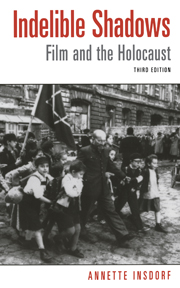Book contents
- Frontmatter
- Contents
- Foreword by Elie Wiesel
- Preface
- Introduction
- I Finding an Appropriate Language
- II Narrative Strategies
- III Responses to Nazi Atrocity
- IV Shaping Reality
- V Third Edition Update
- 14 The Holocaust as Genre
- 15 Rediscoveries
- 16 Rescuers in Fiction Films
- 17 The Ironic Touch
- 18 Dysfunction as Distortion: The Holocaust Survivor on Screen and Stage
- 19 Documentaries of Return
- Annotated Filmography (Third Edition)
- Filmography (Second Edition)
- Notes
- Bibliography (Second Edition)
- Bibliography (Third Edition)
- Relevant Websites
- Index
17 - The Ironic Touch
Published online by Cambridge University Press: 14 January 2010
- Frontmatter
- Contents
- Foreword by Elie Wiesel
- Preface
- Introduction
- I Finding an Appropriate Language
- II Narrative Strategies
- III Responses to Nazi Atrocity
- IV Shaping Reality
- V Third Edition Update
- 14 The Holocaust as Genre
- 15 Rediscoveries
- 16 Rescuers in Fiction Films
- 17 The Ironic Touch
- 18 Dysfunction as Distortion: The Holocaust Survivor on Screen and Stage
- 19 Documentaries of Return
- Annotated Filmography (Third Edition)
- Filmography (Second Edition)
- Notes
- Bibliography (Second Edition)
- Bibliography (Third Edition)
- Relevant Websites
- Index
Summary
The word “memory” invokes commemoration, a natural result of remembering. But it might be just as necessary in 2001 to dismember as remember – to analyze the details of the World War II past, provoke, and confront the audience with a stimulus to moral as well as historical awareness. A number of recent films have succeeded in creating fertile discomfort through the use of dark humor, from Michael Verhoeven's The Nasty Girl and My Mother's Courage to such controversial “comedies” as Genghis Cohn. Others, such as Train of Life, Life Is Beautiful, and Jakob the Liar, use humor as a balm and buffer, with comic heroes whose ruses are tantamount to resistance.
The Nasty Girl (Das Schreckliche Madchen, 1990) is based on the real experiences of Anja Rosmus, born in 1960 in the Bavarian town of Passau. She won the Scholl Prize, an annual award in honor ofHans and Sophie Scholl – martyrs of the resistance movement about which Verhoeven earlier made The White Rose – for her work as a historian unearthing the Nazi past of her hometown. On the night of the awards, she was seated at the same table as Verhoeven; within two years, he had directed a fictionalized version of her story, starring Lena Stolze (who played Sophie Scholl in both The White Rose and Percy Adlon's The Last Five Days!). The Nasty Girl won the prize for Best Director at the Berlin Film Festival – and the New York Film Critics Award for Best Foreign Film – not simply because of the compelling story or the fine acting, but for the ironic style with which Verhoeven chose to tell it.
- Type
- Chapter
- Information
- Indelible ShadowsFilm and the Holocaust, pp. 276 - 292Publisher: Cambridge University PressPrint publication year: 2002



